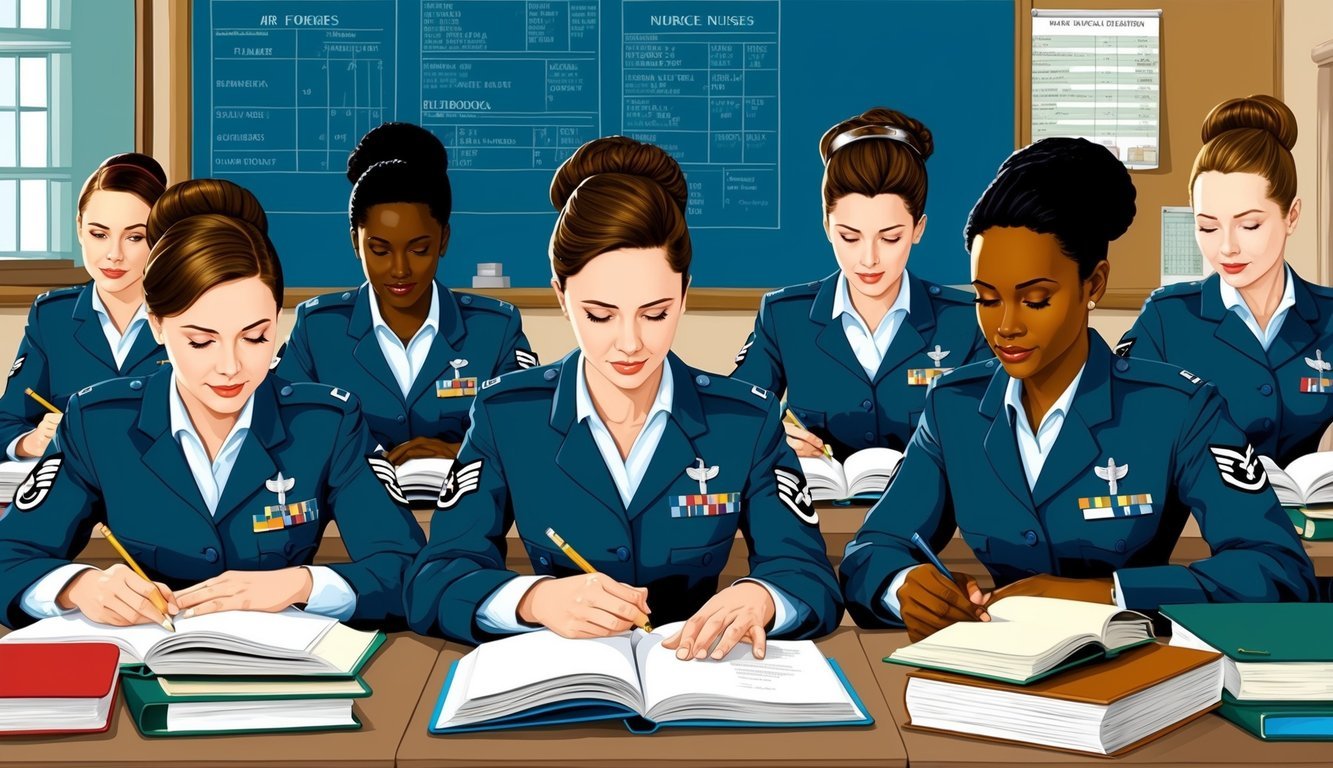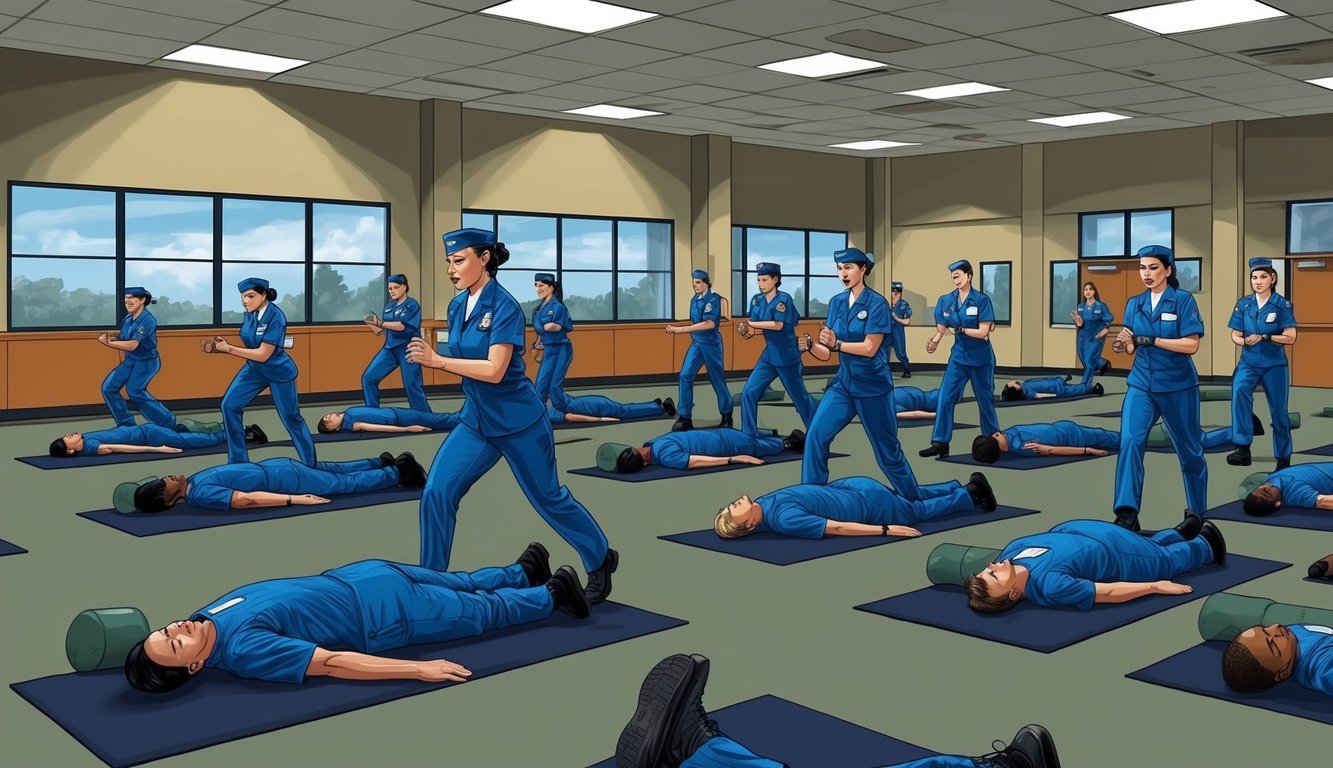Becoming a nurse in the Air Force is a rewarding path for those who want to serve their country while pursuing a fulfilling healthcare career.
To qualify, you need a Bachelor of Science in Nursing (BSN) along with a valid Registered Nurse (RN) license.
This role allows you to advocate for Airmen and their families, providing vital medical care and support in various challenging environments.
The application process includes meeting specific eligibility criteria, attending Officer Training School, and obtaining the necessary security clearance.
Additionally, you will explore specialty qualifications that can enhance your career opportunities within the Air Force Nurse Corps.
This diverse field offers unique experiences, from working in hospitals to providing care in the field.
Your commitment as a nurse in the Air Force includes a service obligation after training, where you can grow your skills and contribute to the health of military personnel.
With solid education and determination, you can embark on a meaningful journey in military healthcare.
Key Takeaways
- You need a BSN and RN license to become an Air Force nurse.
- The selection process includes training and meeting various eligibility criteria.
- Career opportunities vary within the Air Force Nurse Corps.
Eligibility and Education Requirements

To become an Air Force nurse, you need to meet specific eligibility criteria and education standards.
This section will cover the requirements related to U.S. citizenship, educational background, and necessary licensing.
Qualifying as a U.S. Citizen or National
To qualify for a position as an Air Force nurse, you must be a U.S. citizen or a national.
This requirement ensures that all nurses serve within the bounds of U.S. law and military regulations.
If you are not a U.S. citizen, you may not be eligible for commissioning.
Exceptions can occur in specific circumstances, but generally, citizenship is the primary requirement.
Demonstrating your citizenship may involve providing official documents, such as a birth certificate or naturalization papers, during the application process.
This step is crucial in establishing your eligibility for any officer role in the Air Force.
Academic Qualifications and Nursing School
You must have a baccalaureate degree in nursing (BSN) from an accredited nursing school to apply.
The Air Force prefers applicants with a strong academic record, typically requiring a Grade Point Average (GPA) of 3.0 or higher.
Enrolling in a nationally accredited nursing program is essential.
Most applicants attend a college or university that offers accredited BSN programs.
Completing the necessary coursework, including clinical training, equips you with the skills needed to care for patients effectively.
After graduation, you will be eligible to take the National Council Licensure Examination (NCLEX), which is required for nursing practice.
Licensing and Certifications
Once you earn your nursing degree, obtaining a nursing license is the next critical step.
After passing the NCLEX, you will receive your Registered Nurse (RN) license.
This license is mandatory to practice nursing and to apply effectively.
You may also be interested in the Nurse Enlisted Commissioning Program (NECP) if you are already serving in the military.
This program allows enlisted personnel to become nursing officers while continuing service.
Maintaining your nursing license and fulfilling ongoing education requirements is necessary for your career.
You must keep up with healthcare standards to provide the best care for patients and to adhere to military regulations.
Officer Training and Military Preparation

In your journey to become an Air Force nurse, officer training and military preparation are crucial steps.
These processes equip you with the skills and mindset needed for a successful career in the Air Force.
Commissioned Officer Training
Commissioned Officer Training (COT) is essential for new officers.
This program is designed to develop leadership skills and cultivate a strong understanding of military operations.
COT typically lasts for about five weeks.
During this time, you will participate in various training exercises.
These exercises focus on enhancing your decision-making, communication, and leadership abilities.
Your training will also cover:
- Military protocols: Understanding ranks, regulations, and discipline.
- Physical fitness: Maintaining a high level of physical conditioning is crucial.
- Teamwork: Learning to work effectively with diverse groups is vital in the military.
For more details on COT, you can visit the U.S. Air Force Officer Training School website.
Air Force Reserve Officer Training Corps
The Air Force Reserve Officer Training Corps (AFROTC) offers an alternative pathway to becoming an officer.
This program allows you to attend college while training to be a commissioned officer.
AFROTC programs are available at many universities across the country.
As a cadet, you will attend leadership labs and participate in field training exercises.
These activities prepare you for the responsibilities of an officer in the Air Force.
Key components of AFROTC include:
- Leadership development: Engaging in drills and exercises to build leadership skills.
- Scholarship opportunities: Many students receive financial aid through ROTC scholarships.
- Military training: Learning core military principles and practices.
Consider checking out the AFROTC website for more information.
Transition from Civilian to Officer
Transitioning from civilian life to becoming an officer is a significant change.
It involves adapting to a structured environment with new expectations.
The transition includes:
- Understanding military life: You will learn the importance of teamwork and hierarchy.
- Meeting physical standards: Staying physically fit is essential for your success.
- Embracing core values: The Air Force emphasizes integrity, service, and excellence. Adapting to these core values is key.
You may also face challenges in adjusting to military culture.
Support systems, such as mentors and peer groups, can help ease this transition.
Leadership Fundamentals and Air Force Culture
Leadership is at the heart of your role as an officer in the Air Force.
You will be expected to lead by example and inspire those around you.
Key leadership fundamentals include:
- Decision-making: An officer must make accurate and timely decisions.
- Communication: Strong communication skills are critical for effective team management.
- Adaptability: The ability to adjust to changing situations is vital.
Additionally, understanding Air Force culture is crucial.
This culture is built on values such as respect, integrity, and service.
Being aware of these values will help you navigate your career as an Air Force nurse effectively.
Specialty Qualifications and Career Opportunities
In the U.S. Air Force, nursing offers various specialized roles and advanced practice opportunities.
Understanding these qualifications is crucial for your career advancement and ensures you are well-prepared for the demands of military healthcare.
Specialized Nursing Roles
The Air Force has numerous specialized nursing roles tailored to different needs.
Examples include:
- Mental Health Nurse: Focuses on patients’ psychological well-being and manages mental health disorders.
- Operating Room Nurse: Works with surgical teams, ensuring patient safety and proper procedure protocols.
- Critical Care Nurse: Provides care for patients with life-threatening conditions in intensive settings.
To become a specialized nurse, you must hold a valid nursing license and meet specific training requirements.
This includes completing additional coursework or certifications relevant to your chosen field.
For more information on specific roles, visit the Air Force Healthcare Careers page.
Advanced Practice Registered Nurses
Advanced practice roles elevate your nursing career significantly.
These include:
- Certified Nurse Midwife: Provides prenatal care and assists in childbirth.
- Family Nurse Practitioner: Offers comprehensive care for patients of all ages.
- Pediatric Nurse Practitioner: Specializes in caring for infants and children.
- Neonatal Intensive Care Nurse: Cares for critically ill newborns.
To qualify for these positions, you typically need a Master’s degree in nursing and specialized certification.
The Air Force provides additional training opportunities for those pursuing these advanced roles.
Continuing Education and Development
Continuing education is vital for maintaining and enhancing your nursing skills.
As a nurse in the Air Force, you may be required to complete ongoing training to stay current with medical practices and technologies.
Programs and workshops are available to help you meet these requirements.
Many healthcare professionals in the Air Force also have access to scholarships and incentives for further education.
These opportunities can help you specialize in areas like anesthetics or advanced pediatric care.
Staying informed about available resources will support your growth in the nursing field.
Explore further education options through the Air Force Healthcare Professionals page.
Application Process and Selection

The application process for becoming an Air Force nurse involves several key steps, including specific application instructions, a selection board review, and interviews.
Understanding these elements can help streamline your path to commissioning.
Application Instructions and Documentation
To apply for the Air Force Nurse Corps, you will need to prepare comprehensive documentation.
Start by completing the Nurse Enlisted Commissioning Program (NECP) application found on the Air Force website.
Required documentation includes:
- A completed application form.
- Current resume.
- Official transcripts from your nursing program.
- Letters of recommendation.
You must also submit a video interview showcasing your qualifications and motivations for entering the program.
Ensure that you meet all eligibility criteria, such as age and medical conditions.
Familiarizing yourself with pre-requisites can make the process smoother.
Selection Board and Interviews
Once your application is submitted, it goes before a selection board.
The board assesses each candidate’s qualifications and readiness.
Important elements include your academic performance, leadership skills, and experience.
The selection will also involve a Chief Nurse interview process, which evaluates your suitability for the role.
This interview focuses on your nursing skills, leadership potential, and commitment to military service.
It’s essential to prepare thoroughly and present yourself professionally, as this can significantly impact your chances of acceptance.
Acceptance and Commission
If selected, you will receive a formal acceptance and commission into the Air Force Nurse Corps.
This will involve background checks and security clearances to ensure your eligibility.
You will also discuss benefits, including a competitive Air Force nurse salary and military pay structure that recognizes your training and commitment.
Upon acceptance, you will begin officer training school, which prepares you for a successful career in military nursing.
Proper preparation at each step can help you succeed in this rewarding field.
Worldwide Service and Duty Stations
Air Force nurses must be prepared for worldwide assignments.
You may find yourself stationed at bases across the globe, which can include remote and challenging locations.
Being worldwide qualified means you can remain flexible for deployments, serving in various capacities.
This flexibility is crucial for supporting military operations and addressing healthcare needs across different environments.
Your adaptability ensures that you play an essential role in the Total Nursing Force, meeting the demands of service members wherever they may be stationed.
Reserve and Guard Service Options
Joining the Air Force Reserves or the Air National Guard offers you alternative paths in your nursing career.
These options allow you to serve part-time while pursuing a civilian career.
You will still be required to meet specific standards, including training and availability for annual training exercises.
Being part of the Reserves or National Guard enables you to gain valuable experience while serving your community and country.
It also provides you opportunities to work alongside active duty Airmen, enriching your skills and networking within the military healthcare system.
As you explore your options, consider how the combination of duty and community service aligns with your personal and professional goals.
Frequently Asked Questions

This section addresses important aspects of becoming an Air Force Nurse.
You will find specific information about physical requirements, age limits, and more to better understand what is needed for a successful career in the Air Force Nurse Corps.
What are the physical requirements for becoming an Air Force Nurse?
To become an Air Force Nurse, you must meet specific physical standards.
These include height and weight requirements, as well as passing a fitness test.
The test evaluates endurance, strength, and overall fitness levels.
You can find detailed standards on the U.S. Air Force website.
Is there an age limit to join the Air Force Nurse Corps?
Yes, there is an age limit.
To join the Air Force Nurse Corps, you must be under the age of 47 at the time of commissioning.
This ensures you are physically capable and ready to meet the demands of active duty service.
What are the requirements for a nurse to join the Air Force Reserve?
To join the Air Force Reserve as a nurse, you need a valid RN license and a Bachelor of Science in Nursing (BSN).
You must also pass a background check and meet medical, moral, and physical standards.
Additional training and education requirements may apply.
Do nurses in the Air Force receive a sign-on bonus?
Yes, Air Force Nurses may be eligible for a sign-on bonus.
The amount varies based on the specialty and need for nurses in particular areas.
These bonuses can provide significant financial support as you begin your service.
Are Air Force nurses required to attend basic training?
Yes, Air Force nurses must complete basic training.
This training is essential for understanding military culture, leadership, and the demands of service.
The program lasts for about eight weeks and is conducted at Maxwell Air Force Base in Alabama.
What rank does a registered nurse hold when entering the Air Force?
When you enter the Air Force as a registered nurse, you typically hold the rank of Captain.
This rank reflects your education and professional qualifications.
It also sets the stage for your responsibilities in the Air Force.

